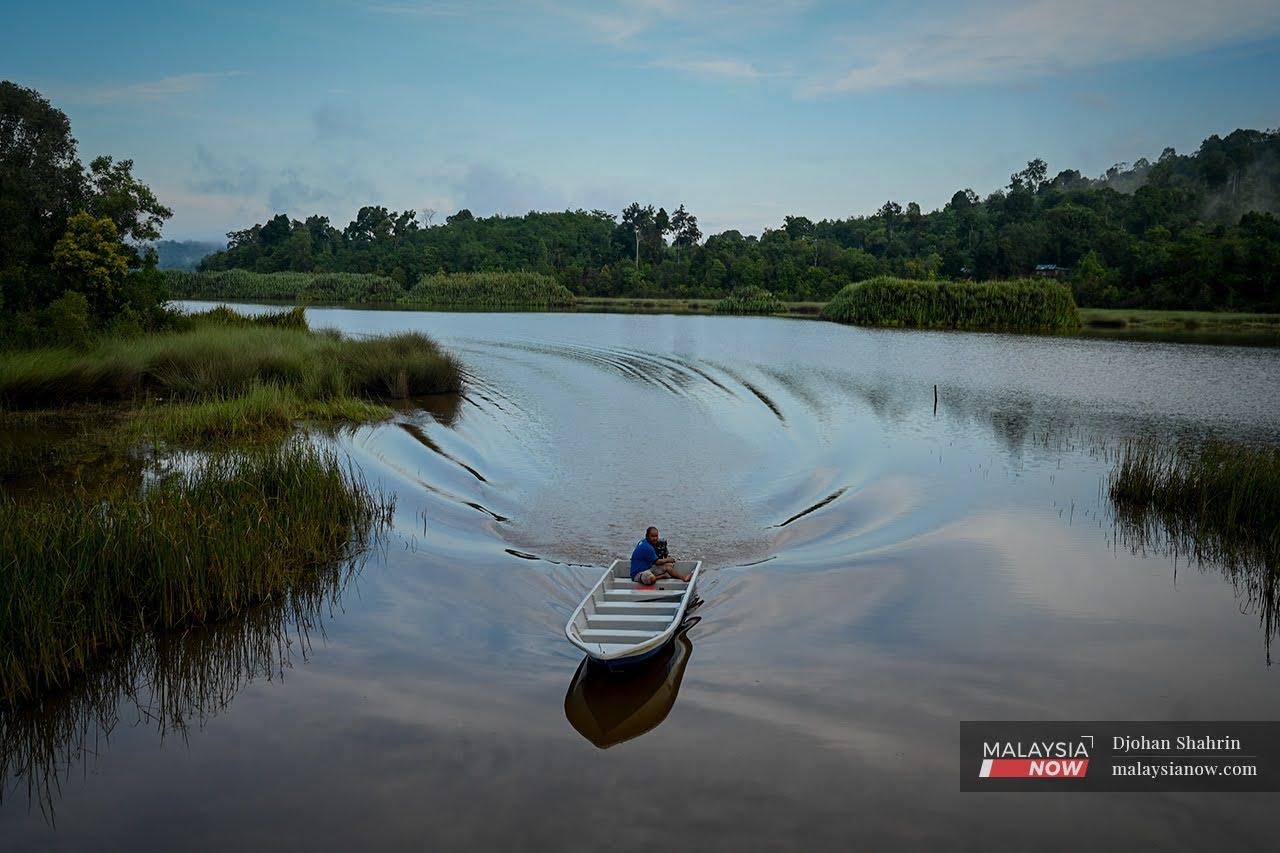Between mining and logging, Tasik Chini’s fate hangs in the balance
The Orang Asli villagers in the area mourn the changes that occurred in the wake of these activities.
Just In
Eagles soar overhead and gibbons call to each other from the trees around Tasik Chini as Abang casts his nets over the side of his small boat.
A soft breeze rustles the leaves, making ripples on the surface of the water. From time to time, Abang pulls in his nets to check on his catch.
Abang, an Orang Asli from the Jakun tribe, has been catching fish at the lake, the second largest freshwater lake in the peninsula, since he was five years old. He also works on his family’s rubber plantation in Kampung Gumum.
He used to paddle about the lake in a traditional rowboat. Now, though, he uses a modern boat with an engine.
He and several other Orang Asli families in the area depend on the lake and the surrounding forest for their survival.
But while his methods may have been modernised, other developments leave him missing the good old days.
For instance, his daily catch is nowhere near as good as it was a decade ago.

“Before, we could catch many fish, all of them big. But now, we get only a handful of fish each week and they are all small,” he told MalaysiaNow.
He said things began changing after the start of mining activities in the area.
This is a problem for him as the fish he catches goes towards feeding his family. Anything extra is sold to the other villagers.
Fishing is not the only thing that has changed with time – tourism activities in the area have gone from bad to worse with the onslaught of Covid-19, and the villagers fear the worst will soon arrive if the lake’s ecosystem is left unattended.

Pak Karim, a boat operator at Tanjung Puput, said the mining activity in the vicinity had marred the natural landscape.
“We are worried that tourists won’t want to come here anymore because the view is gone,” he said.
“The water in the lake has also become cloudier due to sediment. We used to be able to bathe here and drink the water, but not anymore.”
Like many others in the tourism industry, Pak Karim has had a rough year thanks to the Covid-19 pandemic. The lack of tourists left him unable to earn any money at all.
Even the little he earned on the side by ferrying students to school, he lost when schools were closed under the movement control order.
He recalled how, before the pandemic struck, tourists from all over the world would visit the lake and the Orang Asli villages around it.
But all that might be only a thing of the past, even after the Covid-19 crisis subsides. The lake has been getting smaller and more and more cloudy due to mining and logging activities in the area.

Maketab Mohamad, a researcher who has been studying the lake for 30 years, said the Tasik Chini ecosystem began failing with the construction of a dam in 1995.
“The issue that emerged was the construction of the dam at Kuala Sungai Chini that was related to the regulation of water in the lake.
“Many Orang Asli were upset because the quality of the water was affected,” Maketab told MalaysiaNow.
The dam was built ostensibly to prevent the water level from dropping, Maketab said, adding however that nature has its own system for taking care of itself.
He said many water guava plants had died because they were submerged in water for too long.
“There was also the problem of mines, although at that time there was only one,” he said.
“Mining activities fluctuated based on market demand for the manganese and iron ore mined in this area.”
The issue, he said, was the maintenance of the mines. Lack of maintenance would cause solids and sediment from the mines to settle in the lake – something that Pak Karim said he had witnessed himself.
Maketab said problems occurred with floods, where water from the lake would spill over into the mining pool and cause a carryover of dirt and solids from the mining area.

“It takes about a month for the water to subside,” he said. “A lot of silt can be carried over in that time.”
There was also an effect on the size and depth of the lake, which gradually became smaller and more shallow, he said.
According to one model, he said, Tasik Chini would only last several more years before being downgraded to a swamp and then completely drying up.
He hailed the conservation efforts by the state government but said these need to be monitored.
“Replanting trees needs to be an ongoing effort, not just for the media spotlight,” he said, referring to the state’s initiative to set out trees and creepers in affected areas.
“Before this, we planted trees in non-hostile, non-acidic locations. Even that took five years. They must monitor what happens during those five years, and see what happens after that.”
MalaysiaNow understands that previous replanting efforts were also destroyed by mining activities.
There are 14 mines with licences, only two of which have yet to expire. While the expiry of the licences comes as good news for the Orang Asli, it is understood that mining activities will be ramped up towards the end of the licensed period.
Awang Alok, the tok batin or leader of Kampung Gumum, hopes for a complete stop to all mining activities.
Speaking to MalaysiaNow, he said work often continues into the night, disturbing what little peace they have left.
“If their licence ends, let it end. Don’t renew it. That is my hope.”
Subscribe to our newsletter
To be updated with all the latest news and analyses daily.
